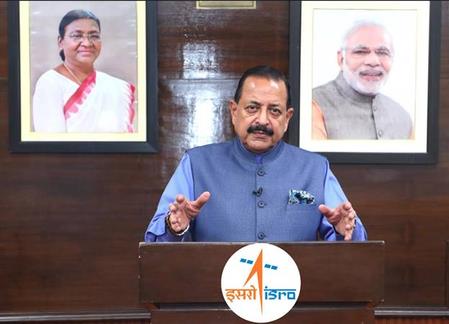
Space Technologies Must Serve Common Citizen: Jitendra Singh
Speaking virtually at the inaugural session of the International Conference on Space 2025, Singh highlighted that the application of space technologies will not only transform agriculture, health, and education but also strengthen governance and public service delivery.
“The true value of space lies in its applications across everyday life -- from agriculture and health to education, urban development, and governance,” Singh said.
“Space must empower every sector and serve the common citizen,” he added.
The Minister also reiterated India's vision of using space for sustainability, equity, and global progress.
“India's space journey is one of perseverance and innovation. Let us dream together, innovate together, and build together -- transforming space from a distant frontier into a shared horizon of unity and progress,” he said.
He lauded India's successful space missions like Chandrayaan-3, which placed India among the leading spacefaring nations by becoming the first to land near the lunar south pole; and the achievements of Group Captain Shubhanshu Shukla, the first Indian Air Force officer to travel to the International Space Station.
“India is entering a transformative phase in its space journey, with ambitious goals ranging from a Bharatiya Space Station by 2035 to landing an Indian astronaut on the Moon by 2040,” Singh said.
He also outlined India's upcoming exploration missions to Mars, Venus, and asteroids, alongside the human spaceflight programme Gaganyaan.
Further, Singh underscored the role of reforms initiated under Prime Minister Narendra Modi's leadership, which have opened the sector to private participation, startups, and academia. Over 300 startups are currently active in areas including launch vehicles, satellites, and ground systems.
“This is not only fostering innovation but also generating jobs, investments, and opportunities for young professionals,” Singh said.
The Minister also emphasised India's commitment to international collaboration. He cited recent partnerships such as the joint NASA-ISRO Synthetic Aperture Radar (NISAR) mission with the United States, and the upcoming Chandrayaan-5 lunar mission with Japan.
“Such cooperation demonstrates how space can serve as a powerful platform for global engagement,” Singh said.
The MoS noted that skill development remains a critical pillar of India's space strategy.
Through ISRO outreach programmes, academic Centres of Excellence, and industry-academia collaborations,“the country is nurturing talent in fields such as satellite design, propulsion, AI-driven applications, and space law”.
The conference, organised by the Confederation of Indian Industry (CII), has drawn over 500 delegates from India and abroad, including government representatives, academics, industry leaders, and startups.

Legal Disclaimer:
MENAFN provides the
information “as is” without warranty of any kind. We do not accept
any responsibility or liability for the accuracy, content, images,
videos, licenses, completeness, legality, or reliability of the information
contained in this article. If you have any complaints or copyright
issues related to this article, kindly contact the provider above.

















Comments
No comment